Key takeaways
- Nietzsche’s concept of “Beyond” encourages self-overcoming and questioning personal beliefs rather than rejecting values outright.
- The “will to power” emphasizes personal growth and creativity, urging individuals to transform challenges into opportunities for development.
- Embracing uncertainty is vital; living authentically means confronting discomfort as a sign of personal evolution.
- Integrating Nietzsche’s ideas into education fosters critical thinking and personal discovery, promoting ongoing self-reflection and dialogue.
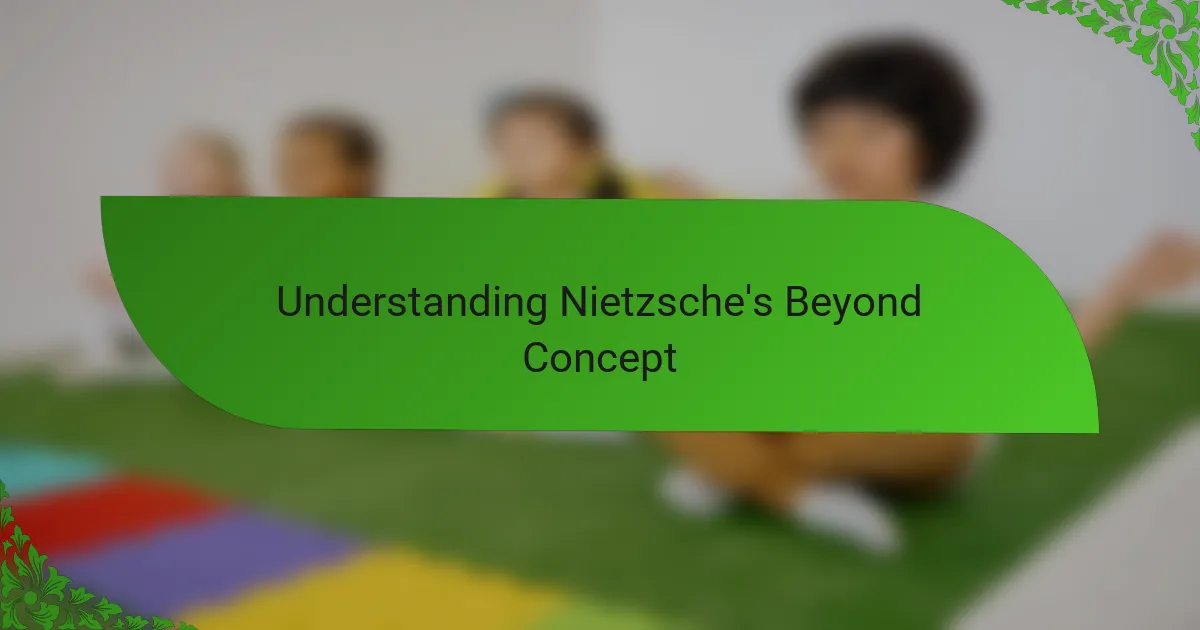
Understanding Nietzsche’s Beyond Concept
When I first encountered Nietzsche’s idea of “Beyond,” I felt both intrigued and challenged. What does it really mean to go beyond established moralities and traditional values? To me, it wasn’t just an abstract concept; it felt like an invitation to rethink everything I had accepted as given in life.
As I reflected on this, I realized that “Beyond” isn’t about rejecting values for the sake of rebellion but about embracing a process of self-overcoming. Nietzsche asks us to question not only society’s norms but also our inner convictions. This pushed me to confront my own limitations—something both unsettling and liberating at the same time.
Have you ever experienced a moment when everything you believed suddenly seemed fragile? That’s the kind of emotional tension Nietzsche’s “Beyond” awakens. It’s an ongoing journey, not a destination, encouraging us to continuously evolve rather than settle into fixed ideals. In that sense, it’s deeply personal and transformative.
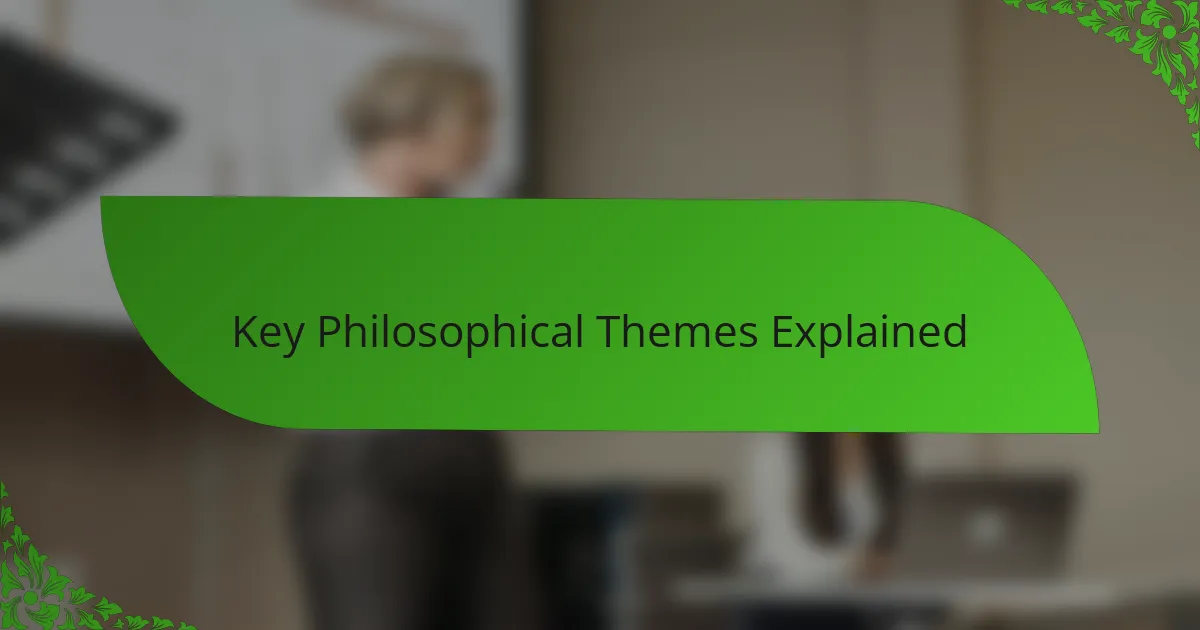
Key Philosophical Themes Explained
One of the core themes I found in Nietzsche’s notion of “Beyond” is the idea of revaluation—this means questioning and reassessing values that we often take for granted. It made me wonder: why do we hold certain beliefs so firmly? When I challenged my own assumptions, I realized how much they were shaped by tradition rather than personal insight.
Another key element is the concept of the “will to power,” which Nietzsche describes not just as domination but as a fundamental drive to grow and assert oneself creatively. I see this theme as a call to harness personal strength in the face of adversity, to transform obstacles into opportunities for self-mastery. It felt empowering, almost like a roadmap for personal development.
Finally, the idea of “eternal recurrence” stood out to me as both daunting and enlightening. Imagine living your life repeatedly, exactly as it is, forever—how would that change your choices? This perspective challenged me to live more authentically, making each moment count instead of drifting through life on autopilot. It’s a theme that lingers in the mind long after reading.
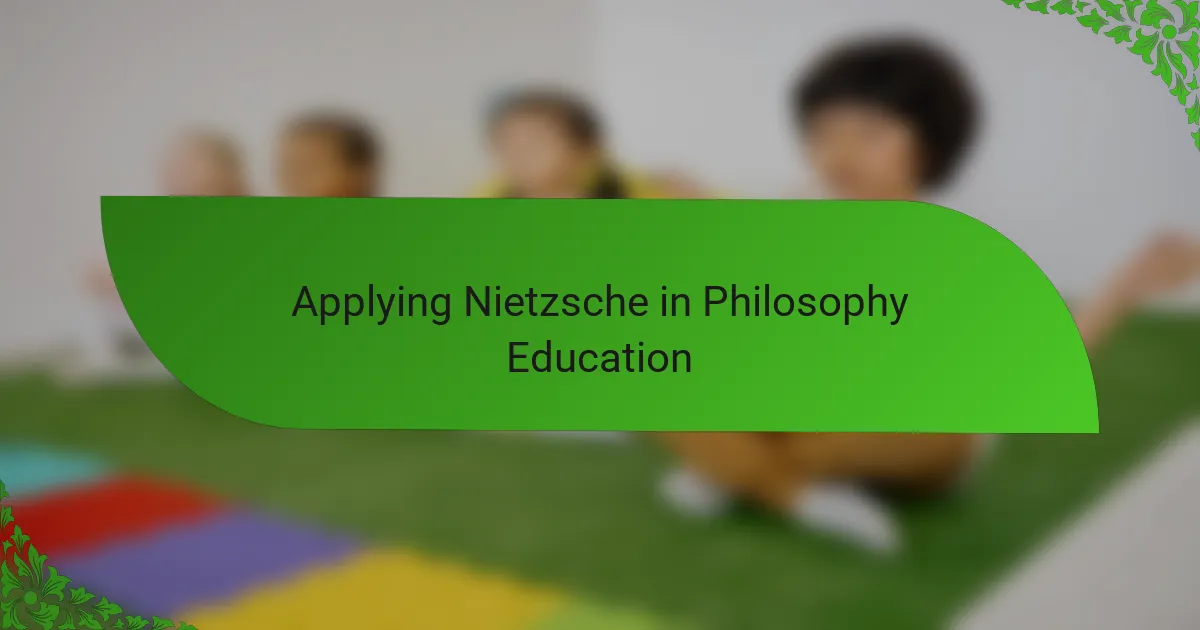
Applying Nietzsche in Philosophy Education
Applying Nietzsche in philosophy education invites students to grapple with their own values rather than passively absorb established doctrines. When I introduced Nietzsche’s challenge to “go beyond,” I noticed students became more reflective, questioning not only societal norms but their personal beliefs. It was fascinating to see this shift from rote learning to genuine self-exploration.
I often ask my students, “What does it mean to overcome yourself?” From my experience, this question sparks lively discussions about growth, failure, and transformation. Nietzsche’s focus on continual self-overcoming resonates deeply because it positions education not as a static achievement but as an ongoing process—one that encourages resilience and creativity rather than comfort and certainty.
In practice, I’ve found that integrating Nietzsche helps students embrace ambiguity and complexity. They learn to tolerate—not eliminate—conflicting ideas, which is crucial in philosophy. Nietzsche’s “Beyond” pushes learners beyond easy answers, fostering a mindset where doubt is productive and personal evolution is the ultimate goal. Isn’t that what education should strive for?

Common Misconceptions About Nietzsche
One common misconception I’ve encountered is that Nietzsche simply promotes ruthless selfishness or amorality. In my experience, this view overlooks how deeply he emphasizes personal responsibility and the challenge of creating authentic values. Have you ever assumed Nietzsche was just advocating for egoism? I used to think that too, until I realized his idea of self-overcoming requires immense discipline and honesty.
Another misunderstanding is thinking Nietzsche’s “Beyond” rejects all traditions outright. From what I’ve seen, it’s more about critically engaging with values—choosing what to keep, what to transform, and what to leave behind. This thoughtful process isn’t about rebellion for rebellion’s sake; it’s about maturation. I remember questioning my own inherited beliefs and feeling uneasy, yet that discomfort seemed necessary to truly move forward.
People often reduce Nietzsche’s thought to abstract, almost nihilistic pessimism. But reflecting on his work, I feel it’s actually filled with a kind of hopeful urgency—a call to live more fully and courageously. Does that resonate with you? For me, embracing “Beyond” was less about despair and more about awakening to life’s possibilities, even in the face of uncertainty.
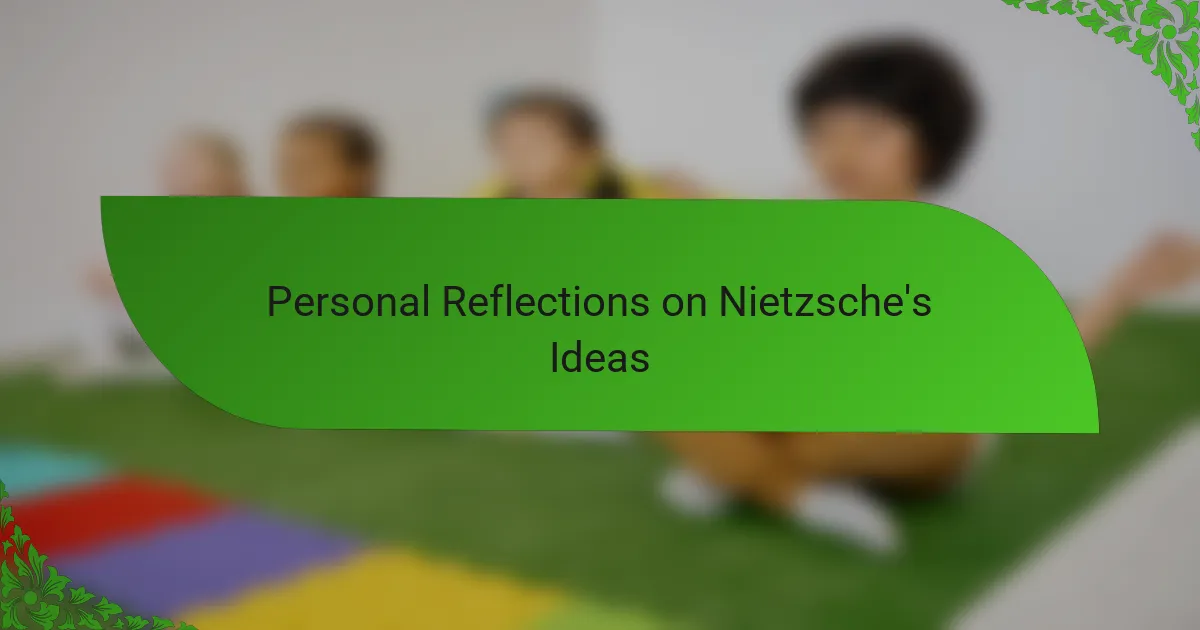
Personal Reflections on Nietzsche’s Ideas
When I first wrestled with Nietzsche’s idea of “Beyond,” I was struck by how it felt less like a distant philosophy and more like a mirror reflecting my own struggles. Have you ever faced moments where your core beliefs felt not just challenged but upended? That’s exactly the unsettling yet invigorating space Nietzsche invites us into—a place where growth demands we loosen our grip on certainty.
What surprised me most was how this process of going beyond isn’t about abandoning values altogether but about actively creating them. It made me confront my fears of change and uncertainty head-on. In those moments, I realized that embracing “Beyond” meant accepting discomfort as a sign of personal evolution rather than failure.
I often find myself returning to Nietzsche’s notion of continuous self-overcoming in daily life. When challenges arise, I ask: Am I resisting growth because it’s uncomfortable or because it’s unworthy? This simple question has transformed how I approach setbacks, turning them into opportunities rather than obstacles—and that shift feels deeply empowering.
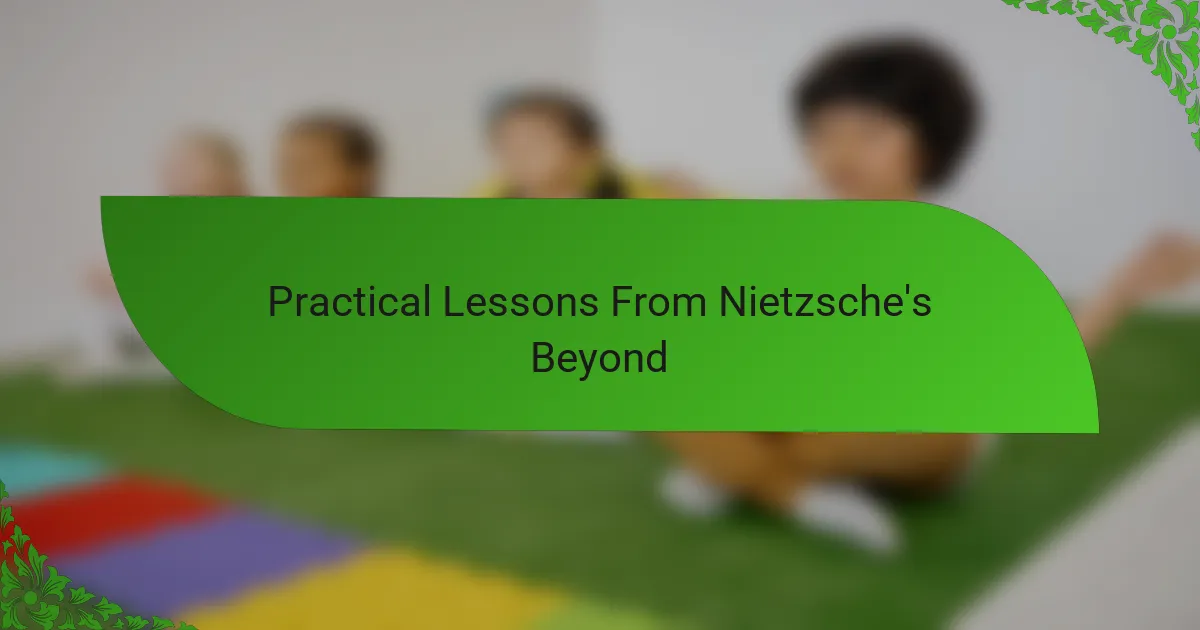
Practical Lessons From Nietzsche’s Beyond
What can we actually take away from Nietzsche’s “Beyond” that applies to everyday life? For me, it’s the reminder to keep pushing past comfort zones—even when it’s hard—to grow into a fuller version of ourselves. I’ve noticed that when I lean into this challenge, setbacks stop feeling like dead ends and become invitations to learn.
Living “beyond” also means crafting our own values rather than accepting inherited ones blindly. Have you ever paused to ask which beliefs truly resonate with you versus those you’ve just absorbed? It’s an uncomfortable, but liberating exercise that I keep coming back to, especially when life throws unexpected changes my way.
Finally, there’s a practical lesson about embracing uncertainty. Nietzsche’s “Beyond” doesn’t promise neat answers; instead, it encourages wrestling with doubt as a path to strength. I’ve experienced firsthand how sitting with that tension, rather than running from it, leads to richer insights and a stronger sense of purpose.

Integrating Nietzsche into Your Studies
Integrating Nietzsche into your studies isn’t just about reading his texts; it’s about letting his ideas shake up your thinking. When I started incorporating Nietzsche’s “Beyond” into my own learning, I found myself repeatedly asking, “What am I willing to question here?” That simple question transformed dry study sessions into moments of personal discovery.
I also noticed that applying Nietzsche requires patience and courage. It’s tempting to want quick answers, but Nietzsche encourages lingering in uncertainty. Have you ever tried sitting with doubt rather than rushing past it? From my experience, that patience opens the door to genuine growth, making philosophy feel alive instead of abstract.
Finally, using Nietzsche’s concepts in study groups can be surprisingly powerful. I’ve seen how sharing personal reactions to “Beyond” fosters deeper dialogue—and sometimes uncomfortable honesty—that challenges everyone to rethink their assumptions. It’s not always easy, but it makes the process of learning feel more meaningful and, honestly, more human.